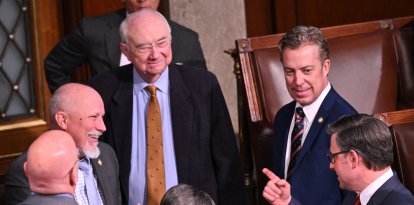The Supreme Court will hear a major tax case in December that could change the tax code as we know it
The highest court in the country will analyze in Moore v. United States if the Sixteenth Amendment applies to profits that have not yet materialized.

Fachada oeste de la Corte Suprema
In December, the Supreme Court (SCOTUS) will hear oral arguments in the case Moore v. United States, which could result in a restructuring of the tax code. The judges’ opinion could cause the Federal Government to lose a lot of money as it will decide whether certain profits can be classified as “unrealized.”
Specifically, the plaintiffs seek to challenge the constitutionality of Section 965 of the Internal Revenue Code. Enacted in the Tax Cuts and Jobs Act of 2017 (TCJA), it “imposes a transition tax on undistributed profits accrued by U.S. Controlled Foreign Corporations (CFCs) between 1986 and the end of 2017,” according to the Tax Policy Center.
The heart of the lawsuit lies in the Sixteenth Amendment, which states that Congress has the power to “lay and collect taxes on income, from whatever source, without apportionment among the several states and without regard to any census or enumeration.” According to Moore, the tax imposed by Section 965 is unconstitutional since the unrealized profits accumulated in a CFC do not meet the definition of income under the aforementioned amendment.
In other words, the bottom line is whether the Sixteenth Amendment applies to profits that have not yet materialized as such. If the Court rules in favor of Moore, it could lead to the nullification of other parts of the tax code, causing a restructuring of the code.
On the government’s side, they maintain that the very concept of profits has to do with accumulation. That is, they define annual income to include all increases in the values of a person’s assets, regardless of whether they converted them into profit when selling them.
Current legislation protects the non-taxation of unearned income, for example, capital gains, which are usually subject to tax only when obtained through sale or other disposition. However, there are also exceptions to this rule.
Currently, the country’s highest court has a 6-3 conservative majority, with Clarence Thomas, Samuel Alito, John Roberts, Neil Gorsuch, Brett Kavanaugh and Amy Coney Barrett on the conservative side of the bench, while Sonia Sotomayor, Elena Kagan and Ketanji Brown Jackson are in the minority as liberal judges.
What would happen if the Court rules in favor of Moore?
According to the Tax Foundation, “this would reduce revenues by about $346 billion over the next 10 years, including refunds of tax payments made between 2018 and 2023 (see Table 1). If the deferral of profits domiciled abroad were reinstated, we anticipate that companies would adjust their behavior. However, our estimate does not take into account this effect, which could further amplify the expected revenue loss below.”
“The case Moore v. United States could have a substantial impact on U.S. fiscal policy and revenues. It could invalidate some current U.S. tax policies, and a broad ruling could go far beyond the provision challenged by the plaintiffs. It could also outlaw potential future tax policies that Congress may wish to adopt given evolving international tax rules. The magnitude of the impact depends on the scope of the Court’s ruling,” they concluded.

























